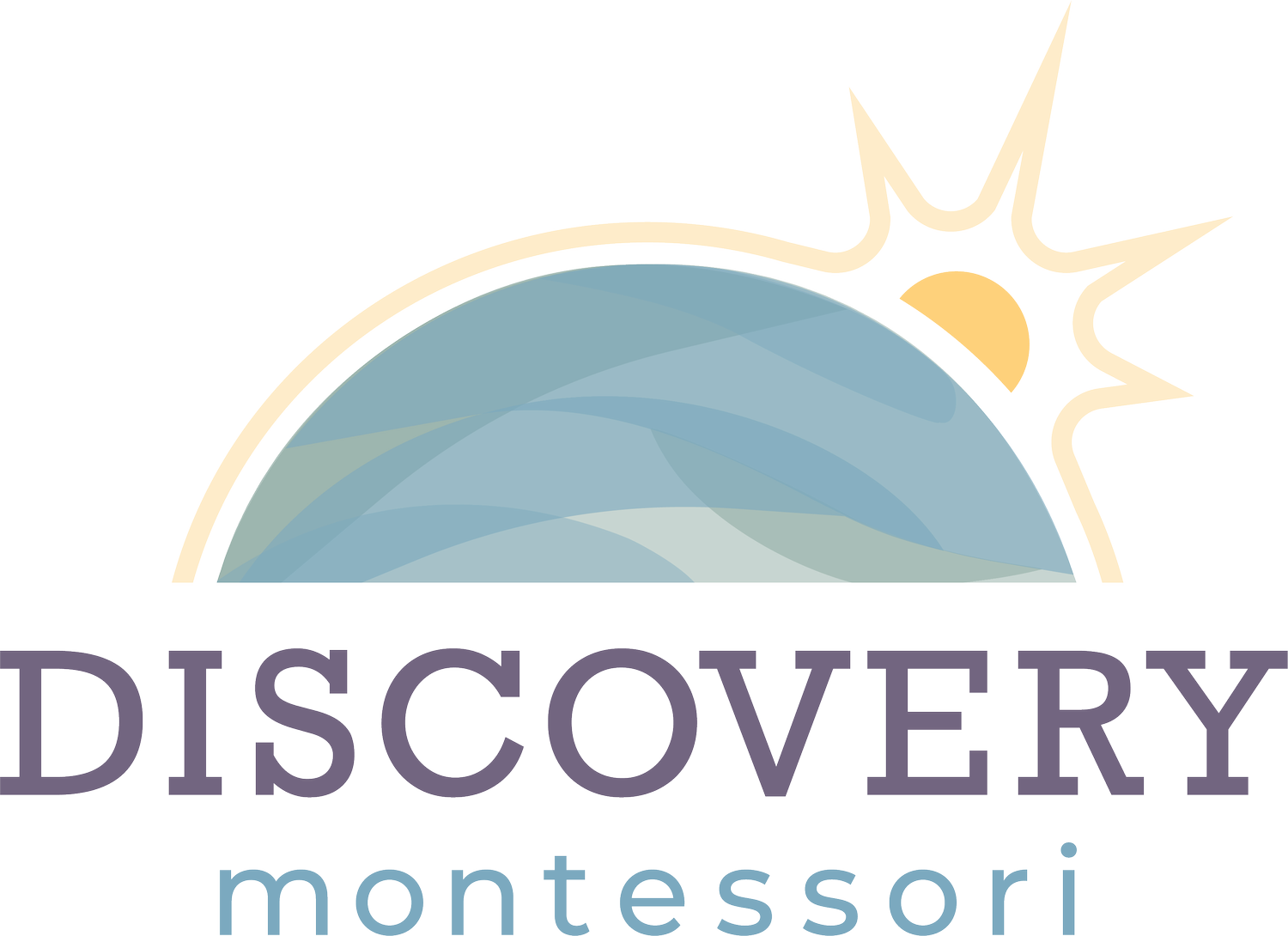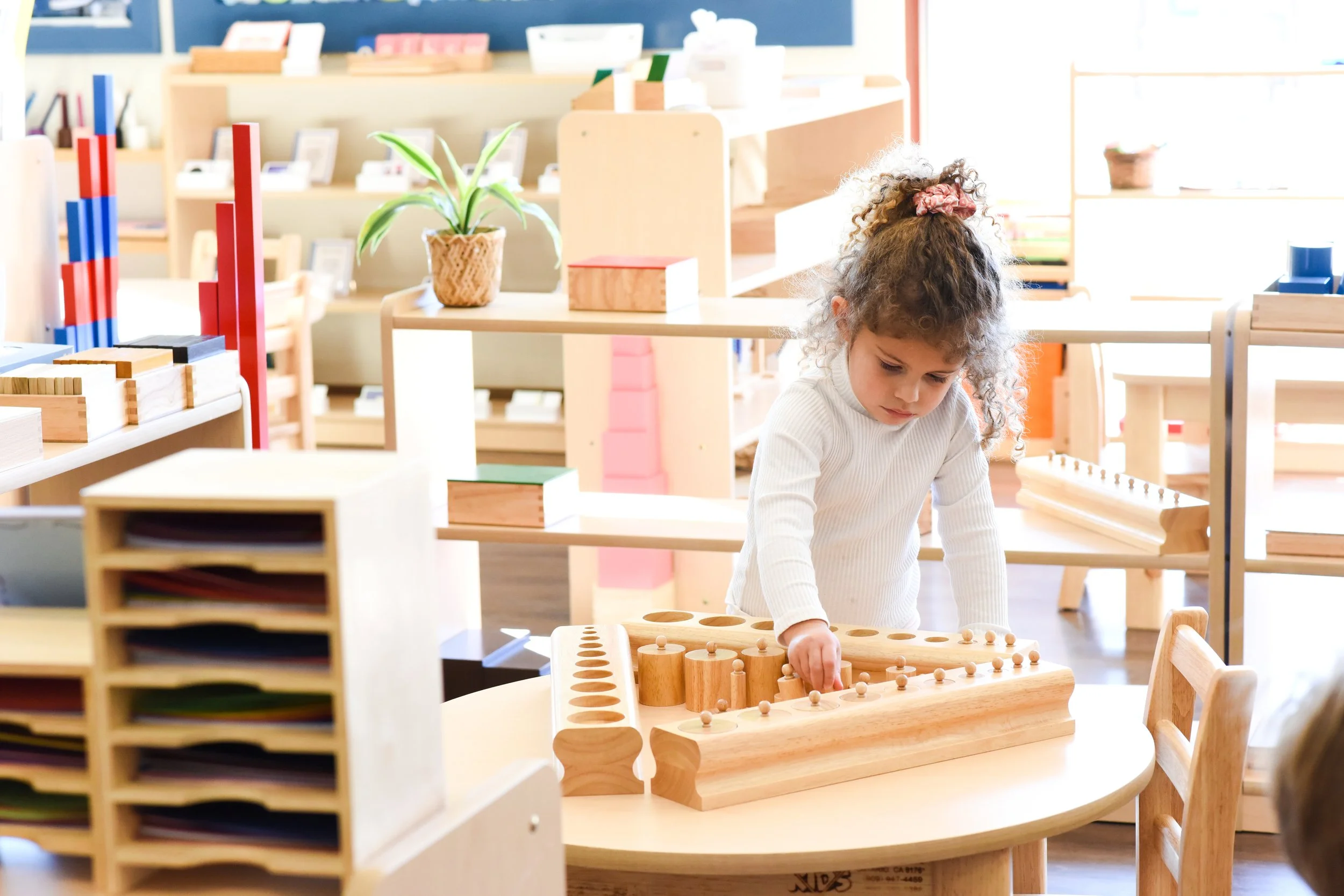We cultivate and honor each child's innate love of learning as they prepare for a life of purpose, integrity, and academic accomplishment.
At Discovery Montessori, students develop the skills and confidence necessary to face the challenges of self, family, community, and the world at large. It is our mission, through the Montessori method, to meet each child’s individual needs while cultivating an atmosphere of teamwork, cooperation, and group participation.
Discovery Montessori serves the community by providing a carefully planned, stimulating, authentic Montessori environment. The intentionally designed Montessori environment encourages children to develop within themselves the foundational habits, attitudes, skills, and ideas that are essential for a lifetime of creative thinking and learning. All concepts are presented in a safe, secure, loving, and respectful environment. The four core curriculum areas of practical life, sensorial, math, and language, are enriched by cultural studies including art, music, and geography. We believe in Maria Montessori’s philosophy that all children are unique, curious about their world, and born with an innate desire to learn. We honor these characteristics, and it is our goal to provide an environment where every child will have a transformative learning experience.
"The role of education is to interest the child profoundly in an external activity to which he will give all his potential."
— Maria Montessori
Why Montessori
Montessori is a system of education based on the understanding that every child has an innate motivation to learn.
Maria Montessori's groundbreaking research on "sensitive periods" in children's development, which are periods when children are intensely interested in a certain type of learning and master it with much greater ease and speed than would be possible at another time, is a foundational element of Montessori education. Another is the fact that young children learn best by using their hands, not by looking or listening, so the Montessori materials are developed with that principle in mind. The lengthy work period in the morning develops the young child's concentration and focus in a natural, unforced way. The close attention paid to each child's interests and needs sometimes means that a child will begin reading or writing quite early, however, it's a myth that Montessori education "pushes" early academics. Each child develops according to his or her own natural rhythm.
We know that children learn best by using all their senses, not just by listening, so we provide carefully designed Montessori materials to support children's need to feel, smell, manipulate, and hear, as well as a thoughtfully prepared environment that promotes physical, academic, and psychological development. Traditional education divides learning into arbitrary categories, but the Montessori curriculum is a deeply interconnected one, with children never learning unconnected facts, but always focusing on integrated patterns of knowledge. At every level, our program is rich with multi-sensory, self-directed learning, conflict resolution skill-building, and an emphasis on both collaboration and independent thinking. Our students learn not a laundry list of quickly outdated facts, but the skills necessary for a lifetime of learning and discovery.
About the Montessori Curriculum
The Montessori curriculum is based upon the teachings and philosophy of education created by Dr. Maria Montessori. Dr. Montessori became the first woman physician in Italy in 1870. In her medical practice, her clinical observations led her to analyze how children learn, and she concluded that they build themselves from what they find in their environment. In 1906 she began to work with a group of sixty young children of working parents in the San Lorenzo district of Rome. It was there that she founded the first "Children's House." What ultimately became the Montessori method of education developed there, based upon Montessori's scientific observations of these children's almost effortless ability to absorb knowledge from their surroundings, as well as their tireless interest in manipulating materials. Every piece of equipment, every exercise, every method Montessori developed was based on what she observed children to do "naturally," by themselves, unassisted by adults. Children at Discovery Montessori will experience the same type of loving environment that will help children become independent, self-motivated learners.
We understand that education is not something which the teacher does, but rather that it is a natural process which develops spontaneously for children. An educated individual continues learning long after the hours and years they spend in the classroom because they are motivated from within by a natural curiosity and love for knowledge. Dr. Montessori felt, therefore, that the goal of early childhood education should not be to fill the child with facts from a preselected course of studies, but rather to cultivate their own natural desire to learn.
In the Montessori classroom this objective is approached in two ways. First: by allowing each child to experience the excitement of learning by their own choice. Second: by helping them to perfect all their natural tools for learning, so they develop and cultivate learning from an intrinsic level. Our Montessori materials are intentionally designed to encourage children’s natural curiosity and desire to explore and discover.
The Prepared Environment
Our learning environment is a carefully curated physical space with materials used to support each child’s learning and development. The goal is to provide children with the opportunity to grow, at their own pace, and in a way that is meaningful to them.
The prepared environment is organized into specific areas, each with its own purpose and set of materials. These areas may include:
Practical life
This area is designed to help children develop independence, coordination, and control of their movements through activities such as pouring water, sweeping, and polishing.
Sensorial
This area is designed to help children develop their senses and perceptual abilities through activities such as matching, sorting, and grading objects by size, shape, and color.
Language
This area is designed to help children develop their language skills through activities such as reading, writing, and storytelling.
Math
This area is designed to help children develop their mathematical thinking and understanding through activities such as counting, measuring, and solving problems.
Cultural subjects
This area is designed to help children learn about the world around them, including geography, science, history, and art.



